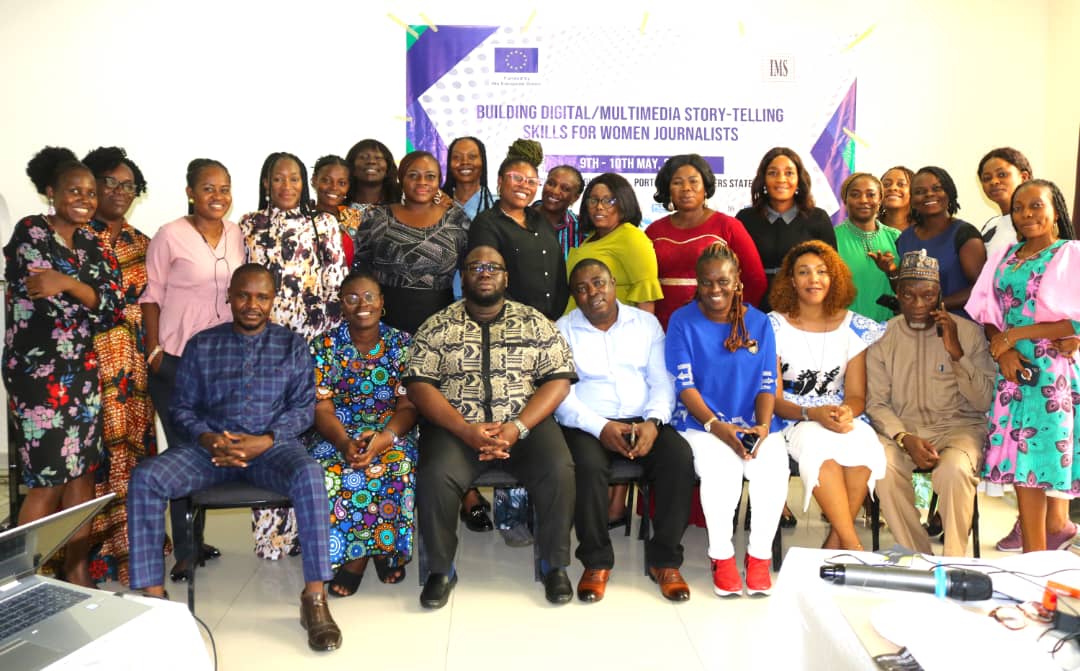Tina Amanda
Female broadcast journalists have been urged to move from the traditional approach to digitalize the multimedia process of content creation.
Program Manager, Institute for Media and Society (IMS) Timothy Bamidele, stated this during a two days training on Building Digital Multimedia Storytelling for Women Journalists in Port Harcourt, organized by the European Union (EU).
He emphasized that the world has grown beyond analogue and shifted to digital, adding that female journalists must brace up and become professional digital multimedia storytellers.
Bamidele said the training is aimed at supporting female journalists to look at different perspectives of issues, such as politics and the electoral process, and create content and share it on multiple digital platforms.
“As an institute, we deliberate on including and empowering women, youth and the vulnerable in our communities, such as the People Living With Disabilities (PWD).
“In this project, two (2) we have trained exclusively over sixty (60) journalists across the country, which is targeted at building the capacity of women journalists in Multimedia storytelling. To ensure the professionalism of women journalist are enhanced.
“There is a skill you acquire; however, there are perspectives to the story you narrate. What we did before the election was not only to build the capacity of women journalists but also to take their stand on issues that have to do with the electoral cycle.
“Now the election is over, the kind of training we are doing is still within our context project document that still looks at the electoral cycle, but the matter we are actually looking at is post-election issues.
“The advantage of this training is we work with our trainee participants with a work plan; this plan tells you the story you will do within a minimum of 13 weeks. For instance, when we talk about post-election, what is the matter that surrounds post-election? You look at it from the angle of women, physically challenged and so on.
“The participants acquire digital skills, so many of them start from scratch and publish stories with podcast element, YouTube video element, and infographics, and they can produce content.
“We are very meticulous in our selection process; we want to influence the narrative so that the voices of the voiceless will be amplified. Issues condemned to the back corner and very important to the country’s economic growth will be brought to the front burner.
“When you look at the issue of peacebuilding, Nigeria should understand that it is not voting day or announcement of an election result that determines the outcome of the electoral process; there are other areas of activity such as going to appeal and supreme court if parties are not satisfied.
“We have realized that storytelling has taken different shapes, including story production and sharing. We have to build the capacity of our female journalists to move from the traditional approach into an approach they will be multimedia inclined and be able to engage the audience”.
The Program Manager, however, expressed optimism that the training, intended to serve as a catalyst, will help female journalists apply what they have learnt to define their narrative.
A Digital Content Expert and facilitator at the program, Ehi Ohiani, said women journalists should make themselves discoverable online by using every new technology to develop and break the news digitally.
“We are in the twenty-first century and we are in the digital world, so we need to be reporting things that are relevant in our age, we can not just publish stories and nobody can find them anywhere.
“We are hoping this training will raise a voice for this kind of issue and women will be much more empowered and found in spheres where decision-makers can set agenda from the perspective of women, by looking at the stories concerning the politics, our daily lives and profession.
“Every opportunity you have to train yourself as a journalist, cease it; it’s essential. Make yourself compliant with the time and age we are in; every new technology that comes out is meant to aid our job, and no technology should be looked at as if they are for the severe Journalist.
“We have to watch it so we do not become irrelevant in the future, and then netizens, journalists or chaps who are not even trained as journalists take over our jobs. Today we have more news being broken via user-generated content than we have hurt by journalists.
“We have more news being broken by netizens, those people who grab the moment; it is because as Journalist we do not have the tools at our beacon call; we think we need big cameras to be able to break the news; meanwhile, you have a Ferrari in your hands which is the smartphone you can use to grab that information immediately and break it.
“We do that because we do not know we are in technology age and time; today we have artificial intelligence and other forms of (Al); let’s grab it quick and be at the top of our game before it overtakes us”.
Rivers State Chairperson Nigeria Association of Women Journalists (NAWOJ), Susan Serekara-Nwikhana and some participants who spoke to our Correspondent shortly after the training said the digital multimedia storytelling training has impacted them the right digital skills to create multimedia content.




